Tinnitus, commonly known as ringing in the ears, is a symptom that can originate from various parts of the hearing mechanism, including the outer ear, middle ear, inner ear, and even the brain. This article delves into the causes, symptoms, diagnosis, and treatment options associated with this auditory condition.
What is Tinnitus?
Tinnitus manifests as an abnormal ear noise and is often accompanied by several related symptoms, such as stress, ear pain, anxiety, depression, difficulty sleeping, difficulty concentrating, and decreased hearing. Persistent and unexplained cases of tinnitus warrant evaluation through a hearing test (audiogram), with measures available to mitigate its intensity.
Causes of Tinnitus
Tinnitus is a symptom with diverse origins, ranging from inner ear damage, loud noise exposure, and medications to conditions like Meniere’s syndrome and brain aneurysms. Understanding the intricate anatomy of the ear, including the tympanic membrane and cochlea, is crucial in comprehending the onset of tinnitus. Various factors, such as blood flow, muscle spasms, temporomandibular joint abnormalities, and damage to the vestibulocochlear nerve, can contribute to this auditory phenomenon.
Symptoms of Tinnitus
Tinnitus may present as constant or intermittent ringing, throbbing, and may occur in one or both ears. Typically, it manifests as a high-pitched continuous tone but can also be described as a click, buzz, or hum. Hearing loss is often associated with tinnitus, even when the ringing is not present.
Diagnosis and Medical Professionals
Primary care doctors or internists can often evaluate tinnitus, but consultation with an otolaryngologist (ear, nose, and throat doctor) may be necessary for a comprehensive assessment. Audiologists play a crucial role in performing hearing tests and assessments to aid in the diagnosis.
Diagnostic Process
A detailed patient history, description of symptoms, and specific questions about the nature of the abnormal sound are essential in diagnosing tinnitus. Various diagnostic tools, including medications, physical exams, hearing tests (audiograms), and imaging (CT scans, MRIs, ultrasounds), may be employed to identify the underlying cause.
Treatment Options
Tinnitus, experienced by up to 15% of Americans, may resolve spontaneously or persist for extended periods. Treatment aims not only to address the root cause but also to alleviate its impact on daily life, including depression and insomnia. Medications, electrical stimulation, and surgical interventions are among the diverse treatment modalities.
Medications for Tinnitus
Several medications, including benzodiazepines, corticosteroid injections, antidepressants, and prostaglandin analogs, may be prescribed to manage tinnitus symptoms.
Home Remedies and Lifestyle Changes
Dietary restrictions, smoking cessation, zinc supplements, melatonin, and Ginkgo biloba are among the home remedies that may provide relief for some individuals experiencing tinnitus.
Surgery and Therapies
Certain cases of tinnitus, such as those related to Meniere’s disease, glomus tumors, and acoustic neuromas, may be treated through surgical intervention. Behavioral therapies, including retraining therapy and relief therapy, offer alternative approaches to managing tinnitus.
Research on Tinnitus
Ongoing research, including studies from institutions such as the University at Buffalo and Dalhousie University, seeks not only to improve treatment options but also to deepen our understanding of why tinnitus occurs. Exploring electrophysiology and functional MRI, researchers aim to identify specific brain regions involved in hearing and tinnitus production, paving the way for future diagnostic and therapeutic advancements.
Prevention Strategies
Minimizing exposure to loud noises, especially in occupational settings, and monitoring medication-induced ototoxicity are key preventive measures to reduce the risk of developing tinnitus.
In summary, unraveling the complexities of tinnitus involves a multidisciplinary approach, encompassing medical, surgical, and therapeutic interventions. While tinnitus may present challenges, ongoing research offers hope for enhanced treatments and a deeper understanding of this prevalent auditory symptom.
References
- Chen, YC. et al. “Tinnitus and hyperacusis involve hyperactivity and enhanced connectivity in auditory-limbic-arousal-cerebellar network.” eLife. May 2015.
- Lehner A. et al. rTMS for the Treatment for Chronic Tinnitus: Optimization by Stimulation of the Cortical Tinnitus Network. Tinnitus Today, Summer 2012.
- Meng Z, et al. Repetitive transcranial magnetic stimulation for tinnitus. Cochrane Database Syst Rev 2011 Oct 5;(10).
- Park, J. et al. “Efficacy of acupuncture as a treatment for tinnitus: a systematic review.” Arch Otolaryngol Head Neck Surg. 2000 Apr. 126(4)
- University of San Francisco Medical Center. “Tinnitus Signs and Symptoms.”
